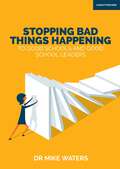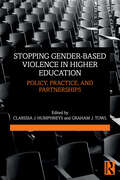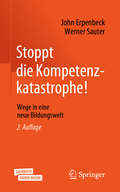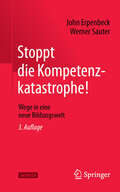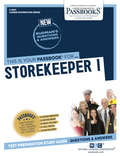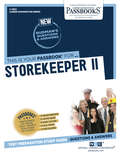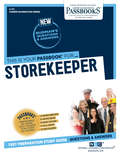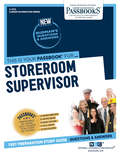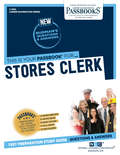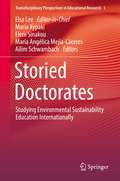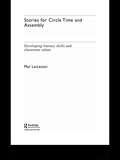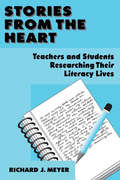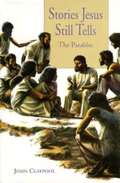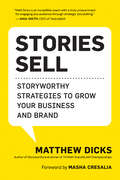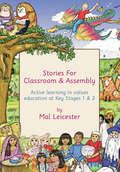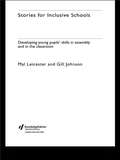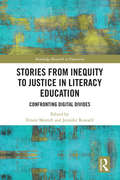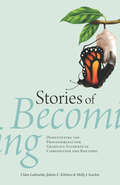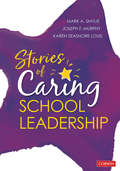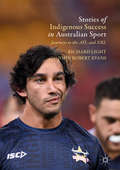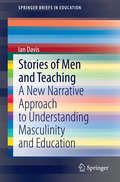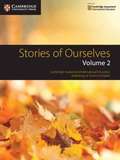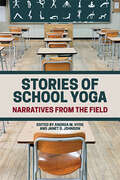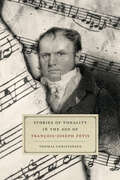- Table View
- List View
Stopping Bad Things Happening to Good Schools - and Good School Leaders
by Mike WatersThis unique book has been written to save schools and their leaders from going belly-up. While no book can anticipate every possible horror situation, Mike Waters' book provides anyone who wants their school to steer clear of shocking events the guidance to do just that. But since such things can happen anyway, it is also about preparing and responding to them if they do occur. Think a school-harming won't happen to you or your school? They are happening more and more and often to the best schools and school leaders. Think your crisis management procedures will see you through? Don't bank on it. Many of the events that rock schools don't start off as obvious crises. They may start off as something seemingly minor and containable - a routine parental complaint, perhaps, or a stupid action by a member. Then things spiral out of control. That's the world that many school leaders find themselves in today. And if you want painful, first-hand evidence for this, you have only to read the school leaders' own accounts of their harrowing experiences provided in the book.Because Dr Waters' book draws directly on his experiences of working with schools rocked by crises they never saw coming, it is filled with practical wisdom. But it is also blessedly short. It's a book for busy people who want to save themselves stress and turmoil. If that's you, then read it before it's too late.
Stopping Gender-based Violence in Higher Education: Policy, Practice, and Partnerships
by Graham J. Towl Clarissa J. HumphreysStopping Gender-based Violence in Higher Education provides a unique insight into how gender-based violence at universities is impacting students and staff and outlines the path toward tangible changes that can prevent it. Bringing together perspectives from academics, activists, practitioners, and university administrators, the book presents a diverse range of voices to constructively critique the field. Structured in three parts, the book begins by addressing the context, theory, and law that stipulates how universities can effectively respond to reports of gender-based violence. It goes on to discuss the most pragmatic ways to address the issue while contributing to prevention and supporting victim-survivors. Finally, the book advocates for the development of beneficial working partnerships with key external services available to university communities and also working with students as partners in an ethical and safe way. Throughout the book, contributors are invited to demonstrate a comprehensive institution-wide and trauma-informed approach to centre the needs of the victim-survivor and prioritize resources to undertake this vital work. Each chapter ends with a brief summary of key points or recommendations and suggested further reading on the chapter topic. Although the authors draw on research and policy from the UK Higher Education sector, the insights will be a useful resource for those in universities around the world. This book is an essential reference point and resource for professionals, academics, and students in Higher Education, as well as indispensable reading for activists, policymakers, police, rape crisis groups, and other organisations supporting these universities who want to make meaningful change in reducing, responding to, and preventing gender-based violence in Higher Education.
Stoppt die Kompetenzkatastrophe!: Wege in eine neue Bildungswelt
by John Erpenbeck Werner SauterDieses Buch zeigt Ihnen, warum unsere Gesellschaft in eine Kompetenzkatastrophe schlittertJohn Erpenbeck und Werner Sauter vertreten in diesem Buch eine radikale These: Unsere Gesellschaft wird von der Kompetenzkatastrophe überrollt. Seit der ersten Auflage dieser Streitschrift haben sich wirkungsstarke Initiativen entwickelt, um Lösungen für die aktuellen Herausforderungen in der Bildung zu entwickeln und umzusetzen. Hinzu kommen unzählige richtungsweisende Einzelprojekte von engagierten Lehrern, Dozenten oder der betrieblichen Aus- und Weiterbildung. Doch aus Sicht der Autoren ist das noch nicht genug – im Gegenteil. Sie sind der Meinung, die Situation habe sich noch deutlich zugespitzt. Vor allem mit Blick auf die Digitalisierung stellen Erpenbeck und Sauter in diesem Werk neue Anforderungen an das Bildungssystem. Jedoch blockierten Schulen, Hochschulen und berufliche Bildung mehrheitlich die notwendige Entwicklung einer neuen Werte- und Kompetenzgesellschaft. Daher analysieren beide Autoren in diesem Buch die von Ihnen proklamierte Kompetenzkatastrophe, weisen auf innovative Wege zu ihrer Überwindung hin und fordern konkrete Bildungsreformen für die Gesellschaft. Mit diesen Impulsen wenden Sie die Katastrophe noch rechtzeitig abIm ersten Abschnitt dieses Buchs beschreiben John Erpenbeck und Werner Sauter, wie sie den Begriff Kompetenzkatastrophe definieren und stellen dieses Konzept der Wissenskatastrophe gegenüber. In den anschließenden Kapiteln setzen sich die Autoren u. a. mit diesen Aspekten und Fragestellungen auseinander:Wissensblödigkeit und KompetenzintelligenzKannten unsere Altvorderen keine Kompetenzen?Kompetenzentwicklung und PISAWissensweitergabe oder Kompetenzentwicklung an UniversitätenKann man Kompetenz lehren?Gehirn, Gehirnmechanik und SelbstorganisationInformations-, Wissens- und Kompetenzgesellschaft Für die Autoren stellt das bisherige Konzept des Bildungssystems – nämlich Wissens- statt Kompetenzweitergabe – eine große Gefahr dar. Mit diesem Werk fordern Erpenbeck und Sauter, in den Lehrplänen und damit auch in Unterrichtsformen aller Art Eigenverantwortung und Selbstorganisation stärker in den Mittelpunkt zu rücken. Denn nur unter realen Anwendungssituationen könnten sich Fähigkeiten ausbilden. Auf diese Weise liefert Ihnen dieses Buch konkrete Handlungsempfehlungen, um die Kompetenzkatastrophe schnellstmöglich aufzuhalten.
Stoppt die Kompetenzkatastrophe!: Wege in eine neue Bildungswelt
by John Erpenbeck Werner SauterSeit der ersten Auflage dieser Streitschrift haben sich wirkungsstarke Initiativen begründet, um Lösungen für die aktuellen Herausforderungen in der Bildung zu entwickeln und umzusetzen. Hinzu kommen unzählige richtungsweisende Einzelprojekte von engagierten Lehrern, Dozenten oder betrieblichen Aus- und Weiterbildnern, die häufig der Öffentlichkeit nicht bekannt werden. Also sind wir auf einem guten Weg? Leider nein!Die Katastrophe hat sich im Gegenteil noch deutlich zugespitzt. Unsere Welt verändert sich rasend mit zunehmender Geschwindigkeit und mit ihr die Anforderungen an uns. Wir benötigen heute völlig neue Fähigkeiten, um uns in der zunehmend digitalen Welt mit Künstlicher Intelligenz zurechtzufinden und trotzdem menschengerecht zu handeln. Diesen Anforderungen wird das Bildungssystem immer weniger gerecht. Sein Grundprinzip – Wissensweitergabe statt Kompetenzentwicklung – führt direkt in eine Bildungskatastrophe.Die künftige Arbeitswelt wird eine Kompetenzwelt sein, in der Werte als Handlungsanker für selbstorganisierte Prozesse mit digitalisierten Systemen und virtuellen Assistenten dienen. Die Digitalisierung führt dabei zu einem radikalen Wandel des Lernens. Schulen, Hochschulen und berufliche Bildung blockieren jedoch mehrheitlich die notwendige Entwicklung der Werte- und Kompetenzgesellschaft. John Erpenbeck und Werner Sauter analysieren diese Kompetenzkatastrophe und weisen Wege zu ihrer Überwindung.Die dritte Auflage wurde unter dem Aspekt der aktuellen rasanten Entwicklungen im Bereich Künstlicher Intelligenz grundlegend aktualisiert und ergänzt.
Storekeeper I: Passbooks Study Guide (Career Examination Series)
by National Learning CorporationThe Storekeeper I Passbook® prepares you for your test by allowing you to take practice exams in the subjects you need to study. It provides hundreds of questions and answers in the areas that will likely be covered on your upcoming exam, including but not limited to: supervision; storekeeping inventory and control; keeping inventory records; name and number checking; arithmetic computation; understanding and interpreting written material; and more.
Storekeeper II: Passbooks Study Guide (Career Examination Series)
by National Learning CorporationThe Storekeeper II Passbook® prepares you for your test by allowing you to take practice exams in the subjects you need to study. It provides hundreds of questions and answers in the areas that will likely be covered on your upcoming exam.
Storekeeper: Passbooks Study Guide (Career Examination Series #C-861)
by National Learning CorporationThe Storekeeper Passbook® prepares you for your test by allowing you to take practice exams in the subjects you need to study. It provides hundreds of questions and answers in the areas that will likely be covered on your upcoming exam, including but not limited to: supervision; storekeeping methods and procedures; keeping records, processing forms and preparing reports; storekeeping operations and problems; employee conduct; and more.
Storeroom Supervisor: Passbooks Study Guide (Career Examination Series)
by National Learning CorporationThe Storeroom Supervisor Passbook® prepares you for your test by allowing you to take practice exams in the subjects you need to study. It provides hundreds of questions and answers in the areas that will likely be covered on your upcoming exam, including but not limited to: procedures related to receipt, storage, issuance and transporting of stock; supervision; job-related mathematics; record keeping and inventory control; workplace safety; and more.
Stores Clerk: Passbooks Study Guide (Career Examination Series)
by National Learning CorporationThe Stores Clerk Passbook® prepares you for your test by allowing you to take practice exams in the subjects you need to study. It provides hundreds of questions and answers in the areas that will likely be covered on your upcoming exam, including but not limited to: stores keeping and inventory control; keeping simple inventory records; name and number checking; clerical operations with letters and numbers; and more.
Storied Doctorates: Studying Environmental Sustainability Education Internationally (Transdisciplinary Perspectives in Educational Research #1)
by Elsa LeeThis book brings together the diverse narratives of researchers’ personalized stories about the process of doing doctoral research (PhD) in the field of Environmental and Sustainability Education (ESE) and about the life after the completion of such life-forming experience. The narratives go beyond the academic to discuss the different ways in which doctoral study in the field of environmental and sustainability education is experienced at the personal and professional level. Contributors are located in different countries in Europe, Australasia and Latin America. The different countries that the authors write from matters because it contextualizes both the process of studying environmental and sustainability education and the way in which this is experienced at a time when the world has become increasingly conscientized towards environmental challenges. As such the book is appreciated by established and emerging scholars in this field and in related fields around the world. Readers are presented with a comprehensive volume ideal for aspiring ESE researchers, supervisors, policy-makers and practitioners.
Stories For Circle Time and Assembly: Developing Literacy Skills and Classroom Values
by Mal LeicesterCircle time is a very popular activity in today’s schools and creates a safe, fun environment where children can think about their relationships, their behaviour, and be honest about their problems and feelings. In this book, the highly successful and popular author Mal Leicester offers a range of lively and engrossing stories, poems and songs for use in circle time activities and assemblies. They are specially written to develop the cognitive and emotional development of young children and aim to encourage active and responsible participation. Using plentiful illustrations, photocopiable pages and practical activities, the author links twelve key value-based themes in the circle time stories to stimulate discussion and enhance pupils’ literacy skills and citizenship education.
Stories From the Heart: Teachers and Students Researching their Literacy Lives
by Richard J. MeyerStories from the Heart is for, by, and about prospective and practicing teachers understanding themselves as curious and literate beings, making connections with colleagues, and researching their own literacy and the literacy lives of their students. It demonstrates the power and importance of story in our own lives as literate individuals. Readers are encouraged to: tell, write, or re-create the stories of their literacy lives in order to understand how they learn and teach; begin the journey into writing the stories of others' literacy lives; find support in their researching endeavors; and examine the idea of framing stories by using the work of other teachers and researchers.
Stories Jesus Still Tells: The Parables
by John R. ClaypoolAesop told fables, Solomon told proverbs, and when Jesus needed to communicate difficult ideas in a calm, persuasive way, He told parables. These were simple stories, whose endings listeners could sometimes anticipate, but whose point they could always grasp. And there was always a surprise in the parables Jesus told. As the parable began, the listeners thought that the story was about someone else, but by the parable's end they knew it was pointed at them. Among the stories Jesus told were the ones about the talents; the treasure, the pearl, and the dragnet; the vineyard owner and his workers; the petulant children; the rich fool; and the great banquet. In this book, John Claypool retells in his own style the familiar stories Jesus once told, and in the retelling Jesus's sweet, clear voice can still be heard. John Claypool invites the reader to open up the deep places in his or her being so that "the Light that enlightens up every person" can illuminate him or her as well.
Stories Sell: Storyworthy Strategies to Grow Your Business and Brand
by Matthew DicksWIN CUSTOMERS AND BUILD BRANDS THROUGH THE POWER OF STORYTELLING Moth GrandSLAM all-time champion storyteller, writer, and business coach Matthew Dicks presents a guide to using the power of storytelling for success in business of any type or size. Matt has found that the basic principles of effective storytelling are universal, teachable, and more crucial than ever for business communication. Jam-packed with examples, Stories Sell reveals the ingredients of a compelling story and then demonstrates how they can be incorporated into persuasive marketing copy, productive face-to-face conversations, effective sales pitches, and presentations that people actually want to hear. Topics include: • The three elements of a winning story: stakes, suspense, and surprise • Finding the right narrative structure (and why beginning at the beginning isn’t always the best method) • The power of being vulnerable: how admitting your mistakes can build rapport with audiences • When and how to use humor • Zigging while others zag: making yourself stand out from competitors Whether you’re an online marketer, advertising professional, salesperson, small business owner, independent contractor, or Fortune 500 executive, Stories Sell will teach you to find your voice and get your message across for maximum impact and profit.
Stories for Classroom and Assembly: Active Learning in Values Education at Key Stages One and Two
by Mal LeicesterThis book is an indispensable resource for use in both the classroom and assembly, providing a delightful collection of fifteen original themed stories and activities, designed to develop key values and skills. Using the power of story, it stimulates reflection and discussion on a range of topics. The material is presented to maximise fun in learning, flexibility and coverage of National Curriculum guidelines for values education teaching. Amongst the key values discussed are: personal responsibility and independence co-operation and sharing honesty and justice respect for world religions. Each session contributes to key skills in English, whilst many of the activities involve use of co-ordination, numeracy and science skills. In addition, the stories are implicitly multicultural in flavour, giving a diverse and innovative feel to the book as a whole. An irresistibly charming, and yet practical tool, its topical tales and photocopiable resources make it an essential classroom companion.
Stories for Inclusive Schools: Developing Young Pupils' Skills
by Mal Leicester Gill JohnsonThis gem is the ideal companion for the busy primary school teacher. Packed with timesaving resources for both the classroom and assembly, it provides a wealth of activities to develop key values and skills in your pupils. Using the power of stories, the authors champion a fresh and inspiring approach to inclusive education across the curriculum, integrating key values into classroom learning. The twelve themed tales stimulate reflection and discussion on such sensitive areas as: bullying prejudice physical disability as well as 'hidden' disabilities alternative lifestyles, cultures, and different appearances parental difference. Lively characters of various ethnic origins, who embody respect for diversity, enhance these multicultural stories. In addition, each session contributes to key skills learning in English, including speaking and listening, reflecting, reasoning and concentrating. Many of the activities also integrate coordination and art and craft skills, numeracy and science skills. The many photocopiable activity pages make this an essential tool for teachers or heads who wish to ensure that inclusion is genuinely working for all children throughout their school.
Stories from Inequity to Justice in Literacy Education: Confronting Digital Divides (Routledge Research in Education)
by Jennifer Rowsell Ernest MorrellChallenging the assumption that access to technology is pervasive and globally balanced, this book explores the real and potential limitations placed on young people’s literacy education by their limited access to technology and digital resources. Drawing on research studies from around the globe, Stories from Inequity to Justice in Literacy Education identifies social, economic, racial, political and geographical factors which can limit populations’ access to technology, and outlines the negative impact this can have on literacy attainment. Reflecting macro, meso and micro inequities, chapters highlight complex issues surrounding the productive use of technology and the mobilization of multimodal texts for academic performance and illustrate how digital divides might be remedied to resolve inequities in learning environments and beyond. Contesting the digital divides which are implicitly embedded in aspects of everyday life and learning, this text will be of great interest to researchers and post-graduate academics in the field of literacy education.
Stories of Becoming: Demystifying the Professoriate for Graduate Students in Composition and Rhetoric
by Juliette C. Kitchens Claire Lutkewitte Molly J. ScanlonBased on findings from a multiyear, nationwide study of new faculty in the field of rhetoric and composition, Stories of Becoming provides graduate students—and those who train them—with specific strategies for preparing for a career in the professoriate. Through the use of stories, the authors invite readers to experience their collaborative research processes for conducting a nationwide survey, qualitative interviews, and textual analysis of professional documents. Using data from the study, the authors offer six specific strategies—including how to manage time, how to create a work/life balance, and how to collaborate with others—that readers can use to prepare for the composition and rhetoric job market and to begin their careers as full-time faculty members. Readers will learn about the possible responsibilities they may take on as new faculty, particularly those that go beyond teaching, research, service, and administration to include navigating the politics of higher education and negotiating professional identity construction. And they will also engage in activities and answer questions designed to deepen their understanding of the field and help them identify their own values and desired career trajectory. Stories of Becoming demystifies the professoriate, compares what current new faculty have to say of their job expectations with the realities that students might face when on the job, and brings to light the invisible, behind-the-scenes work done by new faculty. It will be invaluable to graduate students, those who teach graduate students, new faculty, and hiring administrators in composition and rhetoric.
Stories of Caring School Leadership
by Karen Seashore Louis Joseph F. Murphy Mark A. SmylieReal-life examples to inform and inspire caring in your leadership practices! The practice of caring is essential to effective schooling. Published as a companion to Caring School Leadership, this comprehensive resource of powerful, real-life stories will make clear the connection between caring leadership and student academic success and well-being. Stories of Caring School Leadership includes a guide for using the stories in self-directed reflection and learning, for educators practicing in schools and professional preparation programs. Readers will find stories that • will help aspiring and practicing leaders reflect upon and further develop caring as a quality of their leadership • affirm the importance of caring as a fundamental quality of school leadership • provide examples of caring school leadership in action that can be analyzed, reflected upon, and used to develop practice Stories have the power to inform and inspire. The stories in this book are evidence of what is possible when caring leadership is practiced in our schools.
Stories of Caring School Leadership
by Karen Seashore Louis Joseph F. Murphy Mark A. SmylieReal-life examples to inform and inspire caring in your leadership practices! The practice of caring is essential to effective schooling. Published as a companion to Caring School Leadership, this comprehensive resource of powerful, real-life stories will make clear the connection between caring leadership and student academic success and well-being. Stories of Caring School Leadership includes a guide for using the stories in self-directed reflection and learning, for educators practicing in schools and professional preparation programs. Readers will find stories that • will help aspiring and practicing leaders reflect upon and further develop caring as a quality of their leadership • affirm the importance of caring as a fundamental quality of school leadership • provide examples of caring school leadership in action that can be analyzed, reflected upon, and used to develop practice Stories have the power to inform and inspire. The stories in this book are evidence of what is possible when caring leadership is practiced in our schools.
Stories of Indigenous Success in Australian Sport: Journeys to the AFL and NRL
by Richard Light John Robert EvansThis book presents journeys of sixteen Indigenous Australian athletes from their first touch of a‘footy’ to the highest levels of Australian football and rugby league, conceptualized as a processof learning. The authors challenge simplistic explanations of Indigenous success in Australianfootball and rugby league, centered on the notion of the ‘natural athlete’. The book tracesthe development of Indigenous sporting expertise as a lifelong process of learning situated inlocal culture and shaped by the challenges of transitioning into professional sport. Individually,the life stories told by the participants provide fascinating insights into experience, cultureand learning. Collectively, they provide deep understanding of the powerful influence thatAboriginal culture exerted on the participants’ journeys to the top of their sports while locatingindividual experience and agency within larger economic, cultural and social considerations.Stories of Indigenous Success in Australian Sport will be of interest to students and scholarsacross a range of disciplines including Indigenous studies, physical education, education, sportmanagement and sociology
Stories of Men and Teaching
by Ian DavisThis book investigates the dynamic relationship between masculinity, fiction and teaching answering one central question. How are male teachers influenced by fictional narratives in the construction of masculinities within education? It achieves this in three major steps: by describing a methodological system of narrative analysis that is able to account for the influence of a fictional text alongside a reading of interview data, by focusing on a specific cohort of male teachers in order to measure the influence of a fictional text and the literary tropes they contain, both widening and restricting perceptions of teachers and teaching. The book demonstrates how fictional narratives and their encompassing ideologies can become a powerful force in the shaping of male teachers professional identities. The book focuses on a collection of 22 fictional narratives drawn from the teacher text genre. Each text describes the world of teachers and teaching from differing perspectives, in differing forms including, literary texts; dramatic works such as plays or musicals; feature films; and television and radio series. The teacher text is a popular and prolific genre. As part of the analysis the book pilots an innovative methodological process hat reconciles the structural and textual differences between fictional texts and interview data in an effort to find points of commonality and mutual influence. Stories of Men and Teaching reveals how teaching professionals utilise tropes found in fictional texts in chaotic and unstructured ways to manage points of professional intensity as they arise. Key features such as legacy, fear, belonging, reparation and violence are identified as themes that occupy male teachers most when considering their own identity and professional performance, and each is also represented in the fictional teacher text canon.
Stories of Ourselves Volume 2: Cambridge Assessment International Education Anthology of Stories in English (Cambridge International Examinations)
by Mary WilmerThis series contains poetry and prose anthologies composed of writers from across the English-speaking world. Stories of Ourselves Volume 2 is a set text for Cambridge IGCSE®, O Level and International AS & A Level Literature in English courses. The anthology contains short stories written in English by authors from many different countries and cultures, including Charles Dickens, Virginia Woolf, Christina Rossetti, Janet Frame, Jhumpa Lahiri, Romesh Gunesekera, Segun Afolabi, Margaret Atwood and many others. Classic writers appear alongside new voices from around the world in a stimulating collection with broad appeal.
Stories of School Yoga: Narratives from the Field
by Andrea M. Hyde; Janet D. JohnsonThe yoga-in-schools movement has been gaining momentum in recent years as adult practitioners realize the benefit of yoga in their personal lives and want to share it with children and youth. As the movement has grown, so has the need to understand how yoga works and its effects on individuals, groups, and school culture. Stories of School Yoga brings together firsthand narratives by teachers and practitioners from diverse settings nationwide to illuminate the multifaceted work, challenges, and benefits of teaching yoga to K−12 students in public schools. The stories here supplement and reframe quantitative research in the field; demonstrate how yoga can mitigate stress and tension, particularly amid an increased focus on standardized curricula and testing; and offer lessons learned and practical insights into planning, implementing, and running these programs. Rich in detail and accessible to nonspecialists, Stories of School Yoga presents helpful resources and a nuanced, on-the-ground look at the yoga-in-schools movement.
Stories of Tonality in the Age of François-Joseph Fétis
by Thomas ChristensenStories of Tonality in the Age of François-Joseph Fétis explores the concept of musical tonality through the writings of the Belgian musicologist François-Joseph Fétis (1784–1867), who was singularly responsible for theorizing and popularizing the term in the nineteenth century. Thomas Christensen weaves a rich story in which tonality emerges as a theoretical construct born of anxiety and alterity for Europeans during this time as they learned more about “other” musics and alternative tonal systems. Tonality became a central vortex in which French musicians thought—and argued—about a variety of musical repertoires, be they contemporary European musics of the stage, concert hall, or church, folk songs from the provinces, microtonal scale systems of Arabic and Indian music, or the medieval and Renaissance music whose notational traces were just beginning to be deciphered by scholars. Fétis’s influential writings offer insight into how tonality ingrained itself within nineteenth-century music discourse, and why it has continued to resonate with uncanny prescience throughout the musical upheavals of the twentieth and twenty-first centuries.
